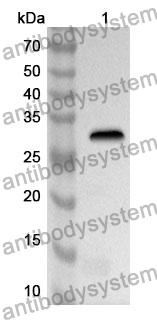Catalog No.
PMK99401
Species reactivity
Mouse
Host species
Rabbit
Isotype
IgG
Clonality
Polyclonal
Immunogen
E. coli - derived recombinant Mouse CADM4 (Val27-Val307).
Tested applications
ELISA: 1:4000-1:8000, IHC: 1:50-1:100, WB: 1:1000-1:4000
Target
Cell adhesion molecule 4 (Immunoglobulin superfamily member 4C) (IgSF4C) (Nectin-like protein 4) (NECL-4) (TSLC1-like protein 2)
Purification
Purified by antigen affinity column.
Accession
Q8R464
Applications
ELISA, IHC, WB
Form
Liquid
Storage buffer
0.01M PBS, pH 7.4, 50% Glycerol, 0.05% Proclin 300.
Stability and Storage
Use a manual defrost freezer and avoid repeated freeze thaw cycles. Store at 2 to 8°C for frequent use. Store at -20 to -80°C for twelve months from the date of receipt.
Age-Dependent Increase in Schmidt-Lanterman Incisures and a Cadm4-Associated Membrane Skeletal Complex in Fatty Acid 2-hydroxylase Deficient Mice: a Mouse Model of Spastic Paraplegia SPG35., PMID:35445918
Trans-homophilic interaction of CADM1 promotes organ infiltration of T-cell lymphoma by adhesion to vascular endothelium., PMID:35213073
A CADM3 variant causes Charcot-Marie-Tooth disease with marked upper limb involvement., PMID:33889941
Differential Contribution of Cadm1-Cadm3 Cell Adhesion Molecules to Peripheral Myelinated Axons., PMID:33397712
Cell adhesion molecule 4 suppresses cell growth and metastasis by inhibiting the Akt signaling pathway in non-small cell lung cancer., PMID:32325280
Necl-4/Cadm4 recruits Par-3 to the Schwann cell adaxonal membrane., PMID:30585357
Nectin-like molecule-4/cell adhesion molecule 4 inhibits the ligand-induced dimerization of ErbB3 with ErbB2., PMID:28900130
Necl-4 enhances the PLCγ-c-Raf-MEK-ERK pathway without affecting internalization of VEGFR2., PMID:28601637
Necl 4 and RNase 5 Are Important Biomarkers for Gastric and Colon Adenocarcinomas., PMID:28561015
Loss of CADM4 expression is associated with poor prognosis in small intestinal adenocarcinomas., PMID:28444978
SRC-2-mediated coactivation of anti-tumorigenic target genes suppresses MYC-induced liver cancer., PMID:28273073
Clinicopathological significance of Necl-4 expression in pancreatic ductal adenocarcinoma., PMID:27980052
Cadm3 (Necl-1) interferes with the activation of the PI3 kinase/Akt signaling cascade and inhibits Schwann cell myelination in vitro., PMID:27658374
Involvement of membrane skeletal molecules in the Schmidt-Lanterman incisure in Schwann cells., PMID:26541343
The Cell Adhesion Molecule Necl-4/CADM4 Serves as a Novel Regulator for Contact Inhibition of Cell Movement and Proliferation., PMID:25893857
Identification of protein markers in patients infected with Plasmodium knowlesi, Plasmodium falciparum and Plasmodium vivax., PMID:25372941
Genetic deletion of Cadm4 results in myelin abnormalities resembling Charcot-Marie-Tooth neuropathy., PMID:23825401
Necl-4/SynCAM-4 is expressed in myelinating oligodendrocytes but not required for axonal myelination., PMID:23700466
Interaction of Necl-4/CADM4 with ErbB3 and integrin α6 β4 and inhibition of ErbB2/ErbB3 signaling and hemidesmosome disassembly., PMID:23611113
Synaptic adhesion molecules in Cadm family at the neuromuscular junction., PMID:23505055
An essential role of MAG in mediating axon-myelin attachment in Charcot-Marie-Tooth 1A disease., PMID:22940629
Clinicopathological significance of CADM4 expression, and its correlation with expression of E-cadherin and Ki-67 in colorectal adenocarcinomas., PMID:22718847
Aberrations of a cell adhesion molecule CADM4 in renal clear cell carcinoma., PMID:21544807
Localization of Cadm2a and Cadm3 proteins during development of the zebrafish nervous system., PMID:21456004
The cell adhesion nectin-like molecules (Necl) 1 and 4 suppress the growth and tumorigenic ability of colon cancer cells., PMID:19565570
Embryonic corneal Schwann cells express some Schwann cell marker mRNAs, but no mature Schwann cell marker proteins., PMID:19387082
Nectin-like proteins mediate axon Schwann cell interactions along the internode and are essential for myelination., PMID:17724124
Cell adhesion and prostate tumor-suppressor activity of TSLL2/IGSF4C, an immunoglobulin superfamily molecule homologous to TSLC1/IGSF4., PMID:16261159
Isolation of the TSLL1 and TSLL2 genes, members of the tumor suppressor TSLC1 gene family encoding transmembrane proteins., PMID:11536053

